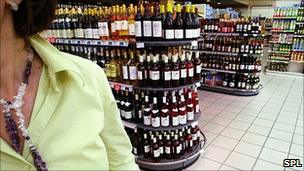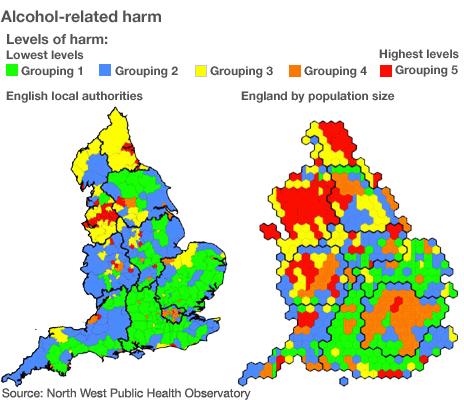Problem drinking shows up north-south England divisions
- Published

The government says it wants to stop the sale of alcohol below cost
There are stark geographical divisions in the toll alcohol takes on health in England, with men in the North West more likely to die prematurely than those in the South East, figures show.
Data collected by the North West Public Health Observatory shows almost 16,000 people died in England last year as a result of alcohol-related harm.
Two-thirds of the areas with the highest harm levels were in the North.
But alcohol-attributable crime was at its peak in London.
The Local Alcohol Profiles in England report recorded an 8% annual increase in the number of people hospitalised for conditions relating to alcohol use, with 606,799 people seeking treatment last year.
The number is an extrapolation based on a list of 40 conditions, and includes those known to be directly caused by alcohol, like liver cirrhosis, to those which may be caused by drinking too much - such as high blood pressure or assault.
Although there is no medical confirmation that patients have these conditions through alcohol consumption, the researchers assume on the basis of a previous studies that a certain proportion will have been caused by misuse.
Price problems
The researchers found some stark regional divisions.

Liverpool had the highest rate of hospital admissions for alcohol-related harm.
In Blackpool, researchers calculated that if all alcohol-related deaths were prevented, men would be living on average nearly two years more. In Bracknell Forest, this figure was just four months longer.
Blackpool also saw the highest rate of incapacity benefit due to alcoholism, and Broadland, in Norfolk, the lowest.
But while two-thirds of local authorities suffering the highest rates of alcohol-related harm were in the North West and North East, areas in and around London registered the highest rate of alcohol-related crimes - with Newham, Westminster, Slough and Islington faring the worst.
Professor Mark Bellis, director of the observatory said: "The price we pay for turning a blind eye to the real extent of alcohol abuse across England is reflected in the new Local Alcohol Profiles for England and it is a price that is paid especially by the poorest communities.
Prof Mark Bellis, director of Health Observatory: 'We have to change our culture of drunkenness'
"It is time to recognise that we are not a population of responsible drinkers with just a hand full of irresponsible individuals ruining it for others.
"We need to see the real cost of alcohol reflected in the price it is sold at, and the warnings about the dangers that alcohol represents not relegated to a tiny corner in alcohol adverts, but written large enough for people to recognise the seriousness of the risks."
Health minister Lord Howe said the government was already taking action to stop the sale of alcohol below cost and to review alcohol taxation and price.
"Supply and price are not the only factors fuelling misuse though, attitudes are crucial. We need to understand better the psychology behind why different groups of people drink too much. Legislation or initiatives will not work unless we have a better understanding of what drives people's decisions.
"We will work across government, and with communities and families, to challenge negative social norms that cause social problems and promote the positives."
I am a paramedic who worked night shifts over the bank holiday weekend. Every single job I attended was alcohol related, none of which required any kind of emergency or hospital treatment. It is so frustrating that I spend most of my working life babysitting drunks rather than doing what I am trained to do and helping out those that genuinely require the emergency services. John, Manchester
I've not drank in three years, and until I stopped drinking I was blind to the harm alcohol did to me and others. Now I've stopped and my view on alcohol is clear: it is society's biggest problem. Alcoholism is not just a disease for the poor. People's attitude needs to change. Getting drunk is not proportional to how much of a good time you have. I've had the best nights out of my life clubbing sober. And there is no hangover in the morning! Getting drunk does not relax you. If it did the police would be encouraging the drunks causing the antisocial crime to just have another, not taking the drink away from them. It is the social situation that is relaxing. The sitting down after a stressful day at work and having a laugh with friends. The mind just associates the drink with the feeling of relaxation and happiness. Our country's views of alcohol need to change. I'm at university currently and alcohol is everybody's life. Except mine. This isn't how things should be. Something needs to be done. Ben, Bristol
When is the government going to accept that they cannot simply leave it to the producers and sellers of alcohol to regulate an industry that has such a widespread social and health cost? I imagine the powerful lobbyists who represent these wealthy drinks suppliers are probably winding back their financial support of the government as they know that time is not on their side and no amount of money will now save them. Simon Downs, Basingstoke
Hopefully this will finally put to rest the daft idea that there's a link between low drink prices and alcohol-related violence or harm. Booze is just as cheap in low harm areas as it is in ones with a big problem. Whether that's drinks from cheap supermarkets or pubs and clubs, there are the same offers at the same low prices wherever you go. Yet, not everywhere has the same level of problem - so the correlation with price is clearly wrong. The basic problem is not one of availability, it's WHY people drink to excess - that's what needs to be addressed. Pete, Harlow
The amount that NHS has to pay for alcohol related problems is ridiculous. I think that as well as promoting to reduce the amount of alcohol intake, some other measures should be taken to try and reduce this problem. An example of this could be banning all forms of drinking and driving, so not even the current limit of one unit. Another addition to this should be curbing the supermarket prices for alcohol. Quite often, beer can be purchased at a cheaper price per can than even water! Advertising for alcohol should also be curbed, with advertising reduced during daytime TV and also during sporting events. And, since the government is so keen on saving money and reducing the deficit, then it can simply increase the amount of taxes on alcohol and cigarettes which would have the double effect increasing government revenue and preventing alcohol prices to be so cheap. P, Birmingham